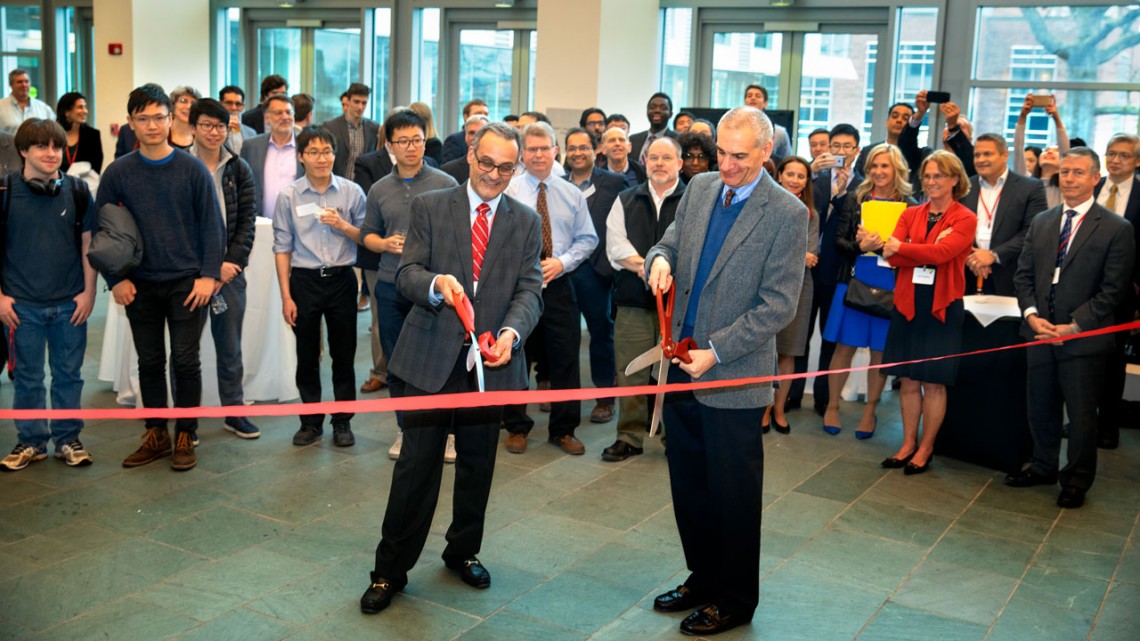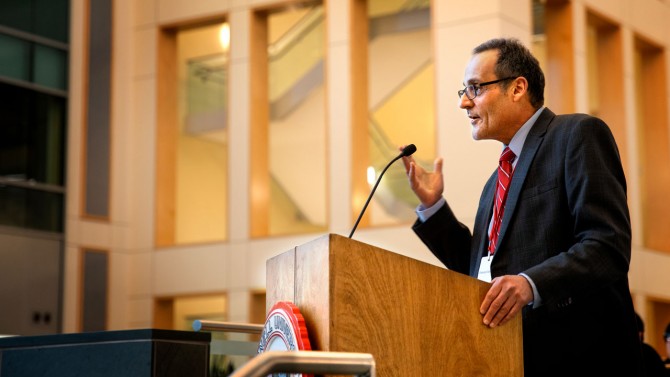
Emmanuel P. Giannelis, vice provost for research and vice president for technology transfer, intellectual property and research policy, left, and Robert Scharf ’77, director of the Praxis Center and an entrepreneur-in-residence at Cornell Engineering, cut the ribbon for the Praxis Center for Venture Development.
New Cornell center to give engineering startups a boost
By Matt Hayes
The word “praxis” is drawn from the Greek language; it implies action, or getting things done. It’s a concept informing and animating a new center aimed at fostering New York state startup companies in engineering, digital technology and physical sciences.
The Praxis Center for Venture Development hosted a grand opening and ribbon-cutting ceremony on March 21 in Duffield Hall. The center will help clients accelerate research and development of their technologies and products. One of the primary goals will be facilitation of clients’ progress toward securing significant outside investment and achieving self-sufficiency, all while supporting business development in New York state.
“There’s an amazing ecosystem of knowledge, instrumentation and experience in so many disciplines at Cornell,” said Robert Scharf ’77, director of the Praxis Center and an entrepreneur-in-residence at Cornell Engineering. “Somewhere within walking distances on campus there is an expert in your topic of interest. This is a tremendous asset that we can harness to benefit entrepreneurs in upstate New York.”
The Praxis Center, housed in Duffield Hall and funded by Cornell’s Research Division, takes as a model Cornell’s Kevin McGovern Family Center for Venture Development in the Life Sciences in Weill Hall. The McGovern Center incubator, which opened in 2011, has helped scores of budding entrepreneurs take their ideas from the back of a napkin to the marketplace.
“There is a strong entrepreneurial spirit at Cornell, especially among our students and young faculty. Resources like the Praxis and the McGovern Center encourage and support a startup mentality with enormous potential for growth,” said Emmanuel P. Giannelis, vice provost for research and vice president for technology transfer, intellectual property and research policy. “At Cornell, we are committed to fostering entrepreneurship by translating knowledge into real world applications.”
In achieving its goal of supporting Cornell startups, the Praxis Center contributes to the university’s land-grant mission by supporting local, regional and state economic development and job creation in science, technology, engineering and math (STEM) fields. Giannelis said the center will entice more venture capital to the region so that entrepreneurs won’t have to go to larger cities in order to grow.
Prospective clients are already working on a range of projects, from crypto-currency and next-generation robotics to ultrasonic sensors with applications in the emerging field of digital agriculture.
That entrepreneurial mentality is aided by the center’s close proximity to three major National Science Foundation-supported research and development laboratories – the Cornell NanoScale Science and Technology Facility (CNF), the PARADIM (Platform for the Accelerated Realization, Analysis and Discovery of Interface Materials) Labs, and portions of the Cornell Center for Materials Research.
This puts the Praxis Center in a unique position, according to Amit Lal, the Robert M. Scharf ‘77 Professor of Electrical and Computer Engineering and a prospective Praxis client.
“It’s kind of amazing,” Lal said. “I don’t think there’s another place where you have a clean room in CNF and a business incubator so close to it. It’s quite a unique thing.”
The incubator model creates the potential for synergies among diverse companies, according to Giannelis. Prospective clients are being considered for a range of ideas that might foster collaboration. Plus there is access to people like Scharf – a retired executive with 12 patents, whose 2003 startup, Protokraft, was acquired by Moog Inc. in 2012 for $17.5 million.
“The Praxis Center is not just a space; it’s not just the infrastructure,” Giannelis said. “There’s also the human element, with mentorship from experienced entrepreneurs that form an integral part to helping young businesses become successful.”
Tom Fleischman contributed to this report.
Media Contact
Get Cornell news delivered right to your inbox.
Subscribe


